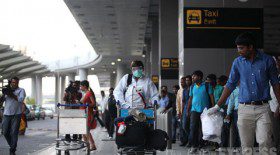This article was originally published in the Indian Express
By Ashish K Jha, K.T. Li Professor of International Health, Harvard School of Public Health; Director, Harvard Global Health Institute, and Tarun Khanna, Director of the South Asia Institute &
Jorge Paulo Lemann Professor, Harvard Business School
 With the ongoing spread of Ebola in West Africa, it is becoming increasingly likely that the disease will make its way to India. So what should India do to prepare? The Union government has already taken several meaningful steps. It has designated hospitals in major cities as Ebola management centres and formed rapid response teams in every state, each of which will include physicians, nurses and epidemiologists. The state teams are being trained by the WHO and the US Centres for Disease Control and Prevention, and will disseminate their training to local first responders. Also, the government has put in place screening protocols at international airports, established 24-hour Ebola helplines staffed by doctors and shortlisted the authorisation of 10 new Ebola-testing labs.
With the ongoing spread of Ebola in West Africa, it is becoming increasingly likely that the disease will make its way to India. So what should India do to prepare? The Union government has already taken several meaningful steps. It has designated hospitals in major cities as Ebola management centres and formed rapid response teams in every state, each of which will include physicians, nurses and epidemiologists. The state teams are being trained by the WHO and the US Centres for Disease Control and Prevention, and will disseminate their training to local first responders. Also, the government has put in place screening protocols at international airports, established 24-hour Ebola helplines staffed by doctors and shortlisted the authorisation of 10 new Ebola-testing labs.
These are all important steps, but they may not be enough. Indeed, if the disease were to arrive and begin to spread, India would need a strategy that is bigger, more aggressive and comprehensive than what it has now. We propose three main areas where policymakers should concentrate additional effort: a stronger focus on diagnostics and therapeutics, greater partnership with the private sector, and a more aggressive approach to public communication. Even if Ebola were not to arrive in India, this would serve as a way to prepare for future similar medical threats.
The first potential weakness in the diagnosis and containment of Ebola is in the identification of potential cases. Stopping an outbreak becomes substantially more difficult as diagnosis is delayed. For a nation of 1.2 billion, India’s 12 prospective diagnostic labs are scarcely enough. The cost of the Ebola test is dropping and a diagnosis can now be made in hours. The US Food and Drug Administration recently approved two new Ebola tests that require just two hours to make the diagnosis. While some of these new testing systems are expensive, having more of them in India will be worth it. Further, cheaper tests are coming soon and as they come on the market, India should make additional efforts to ensure these tests become widely available. If a patient arrives in Patna, having the blood sample sent far away not only needlessly delays that patient’s diagnosis but also allows the disease to spread to others if she is not properly quarantined during that time.
If the disease burden in India increases beyond a few sporadic cases, having diagnostic centres in every state and region will be critically important.
Read the full article: http://indianexpress.com/article/opinion/columns/if-ebola-comes-to-india/#sthash.SJDQYI3T.dpuf
